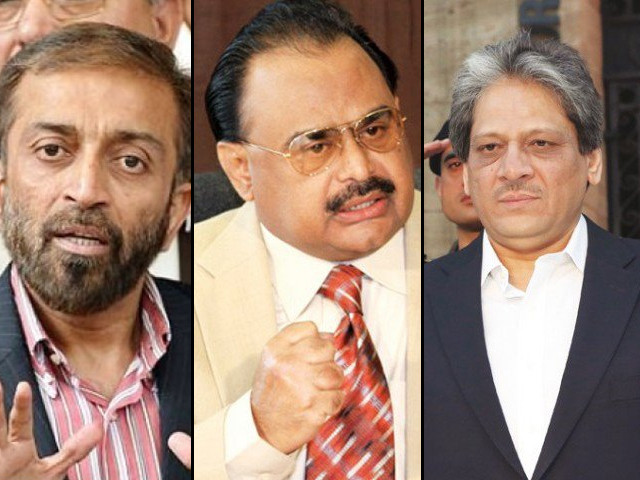The reason why this demand has come after so many years of Dr Ebad in office is a charge sheet prepared by Sattar a few days ago during a press conference, where he said that Dr Ebad had failed to meet people’s expectations, as the murder of innocent civilians in the urban areas of Sindh continues, including the extrajudicial killings of MQM workers, and that these were the matters which the incumbent governor had failed to take notice of.
Dr Sattar also complained that after the 2013 general elections, a targeted operation was launched in Karachi and as governor, Dr Ebad had failed to check whether the operation was getting the desired results.
MQM fails to understand the position of a governor in a political system like Pakistan’s, where real power lies with the prime minister and parliament at the centre and the chief ministers and assemblies in the provinces. The president of the country, and the governors of the provinces who are appointed by the president as his representatives at the provincial level, have only few powers and rather representative obligations like opening a newly constructed road or building or administering the oath of office to the chief minister, his cabinet or the chief justice of the high court in a province.
The idea is that the president as well as the governors should be people politically neutral because they have to represent the whole spectrum of politics present in the country or province. It has not been handled like this in Pakistan because the idea of political neutrality is not understood and accepted and perhaps the incumbents also don’t understand.
These are prestigious positions and one is heaved into them in Pakistan by a political party and that party expects loyalty and favours in return. But this is against the spirit of the position. The so-called ‘charge sheet’ against Governor Ebad thus is actually a sheet of praise for him because it testifies that he did not favour the party to which he belonged at one time and that he tried to keep his neutrality as required by the post.
If the MQM in the precarious situation in which it finds itself needs a good and clean politician and wants Ebad back, they should have asked him in a decent way to resign and rejoin MQM. The ongoing killing of workers of MQM and others as well as the ongoing operation in Karachi and its results do not come into the responsibility of the governor and keeping away was the politically right way. The MQM is just illustrating its ignorance by issuing such a charge sheet against Governor Ebad because the complaint actions fall beyond his jurisdiction.
We, just a couple of months ago, saw the resignation of the Punjab governor who was considered to be a loyalist of the Pakistan Muslim League-Nawaz (PML-N) and who resigned in frustration because even he seems not to have understood the position he was taking. In January, Governor Punjab Chaudhry Sarwar announced his resignation while voicing his frustration about the helplessness he was feeling in this position. He had come with an idea to ‘deliver goodies to the masses’, but whatever he had in mind he was not able to achieve because in that position he had no powers to do so.
The constitution of Pakistan says that,
“Subject to the Constitution, in the performance of his functions, the Governor shall act [on and] in accordance with the advice of the Cabinet, or the Chief Minister.”
Which means he has no decision-making powers of his own. This is so since the 18th amendment was passed in 2010, which has taken most of the previous powers away from the president and governors and made them a 100 per cent dependent on the ‘advice’ of the prime minister, the chief ministers and the cabinets. In light of this new situation, one could scrap the position of the governor and president and take this financial burden away from the exchequer. Or – as that has been proposed many a time – we could reorganise Pakistan’s political system into a presidential rule where the position of president and governors would carry main political impact and adopt proportional representation system as electoral system.
This latest would provide for elections in two tiers held on party basis and not on constituency basis and where candidates are running the show to ruin it as is the case of recounting of ballots and formation of judicial commission and then seeking the Apex Court’s relief to politicise national institutions to gain time and divide the nation into different camps.
The best thing in the proportional representation system is that the first round of voting is held in which all parties are allowed to contest and then two parties securing the highest number of votes in the first round contest the second round of voting in which any one party securing more than 50% is declared elected to form a government and the leader of this party is elected president for a fixed term. From the list of these two parties, members of parliament are chosen keeping in view the percentage of the votes received by each party. The cabinet formed by the president is not restricted to the parliament only but he can include any citizen whom he considers fit for the job of office.
To resolve the issue of concentration of power at the centre or provincial headquarters, we can look into an old suggestion given by Retired Air Marshal Asgher Khan to appoint Lt. Governors with administrative powers at the divisional level in the country, which is also a workable proposal if we are serious in mending our fences and not trying to settle old scores at the cost of innocent blood of people.
There are many options how the current system could technically be improved but any political system however wonderful it might be will only work if the people running it are sincere, have fear of God and accept the rules of the game. This is a major draw-back in Pakistan, where everybody is bending the rules of the game for their own favour.
God bless humanity and Pakistan.



COMMENTS
Comments are moderated and generally will be posted if they are on-topic and not abusive.
For more information, please see our Comments FAQ